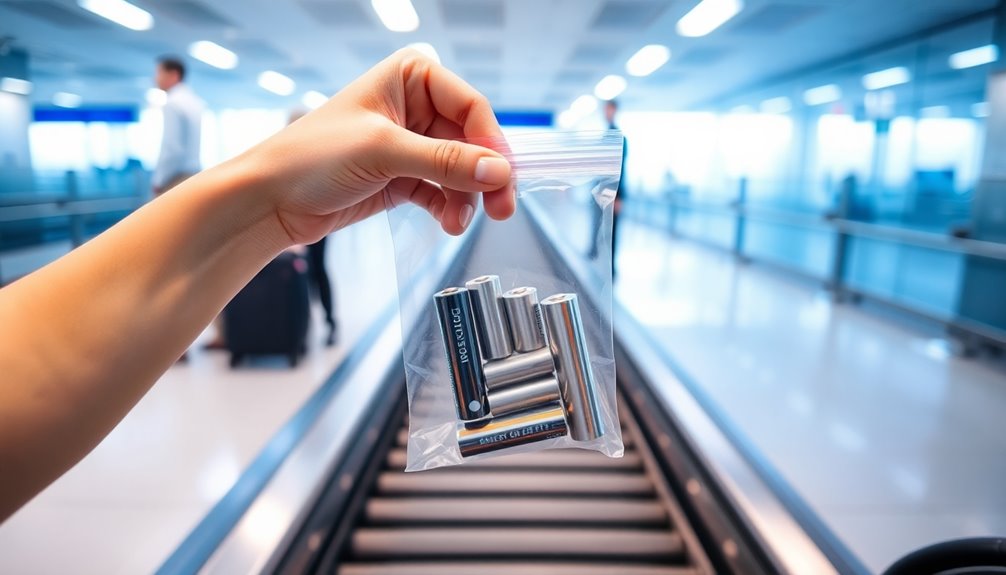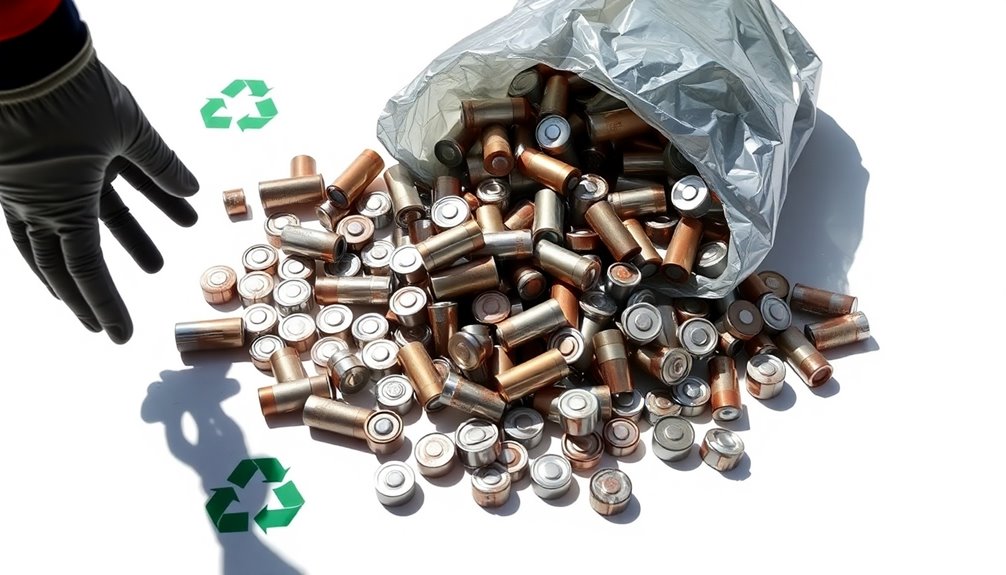Yes, you can bring batteries on a plane, but you need to follow specific guidelines. Undamaged lithium batteries are allowed in both carry-on and checked luggage. However, spare lithium batteries must stay in your carry-on. For batteries exceeding 100 watt-hours, you're limited to two and need airline approval. Always pack batteries in original or protective cases to avoid damage. Inspect them for any signs of wear before traveling. If you see any issues, it's best not to take them. Curious about specific airline rules or safety tips? There's more information that can help you travel safely with your batteries.
Key Takeaways
- Undamaged lithium batteries can be packed in both carry-on and checked baggage, while spare batteries must remain in carry-on luggage only.
- High-capacity lithium batteries over 100 watt-hours require airline approval and are limited to two per passenger in carry-on.
- Use original packaging or fire-resistant bags to protect loose lithium batteries and avoid short circuits during transport.
- Report any signs of overheating or damage immediately to the flight crew, and never use water to extinguish lithium battery fires.
- Be aware of varying airline regulations and international rules regarding battery transport, as some countries have specific bans or requirements.
Importance of Battery Safety
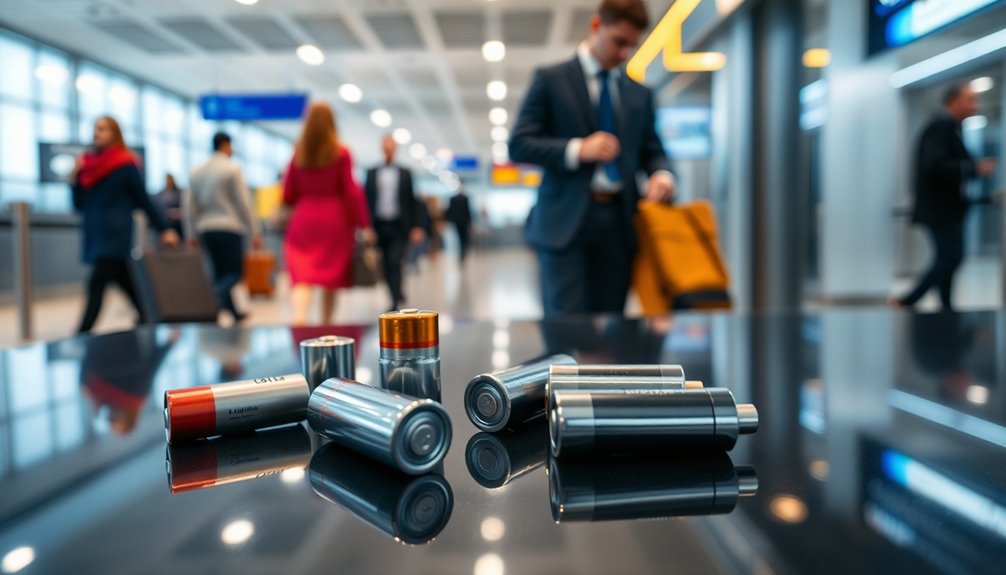
Why is battery safety such a critical concern when flying? Batteries, especially lithium-ion ones, can pose significant fire risks due to overheating and thermal runaway. That's why strict safety protocols are in place.
If you don't properly pack or handle your batteries, they could leak corrosive substances, leading to chemical burns. Regulations and restrictions require that loose or spare lithium batteries be carried in your carry-on luggage, ensuring they're accessible for security checks and reducing accident risks.
Regularly inspect your batteries for damage because using compromised batteries can result in dangerous situations during flights. Remember, keeping battery terminals protected and following these guidelines is essential for safe travel.
Your vigilance directly contributes to a safer flying experience for everyone.
Airline Regulations Overview
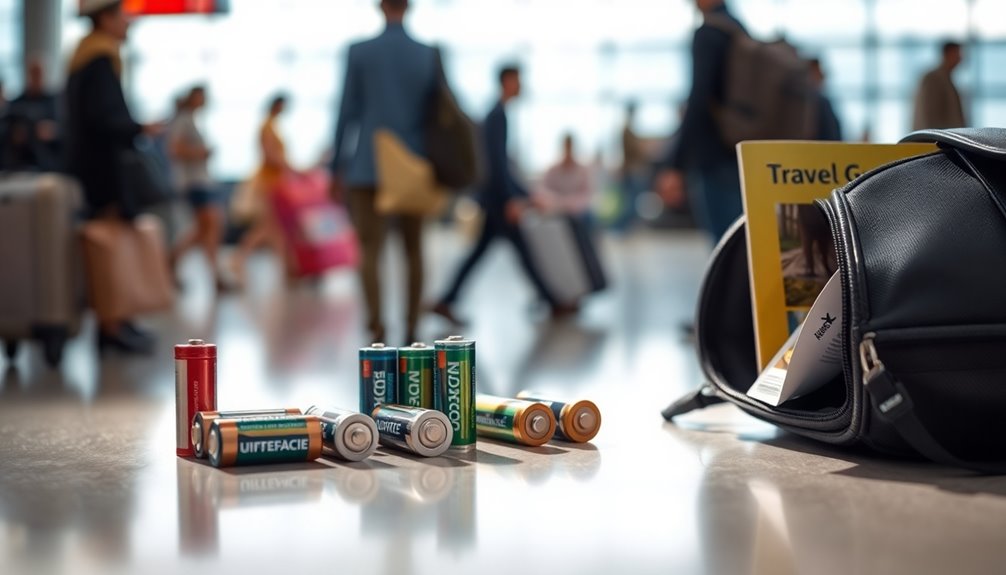
When traveling by air, understanding airline regulations regarding batteries is essential for a smooth journey. Most airlines allow undamaged lithium batteries in both carry-on luggage and checked baggage, but spare lithium batteries must stay in your carry-on. High-capacity lithium batteries over 100 Watt-hours are limited to two per passenger and also need to be in carry-on luggage. Loose batteries shouldn't be packed in checked bags, but installed batteries in devices are fine. International guidelines align closely with US, UK, and EU regulations. Familiarizing yourself with specific airline policies will help you avoid confiscation and delays during security checks.
| Battery Type | Carry-On Luggage | Checked Baggage |
|---|---|---|
| Undamaged Lithium Batteries | Allowed | Allowed (installed) |
| Spare Lithium Batteries | Allowed | Not allowed |
| High-Capacity Batteries | 2 max | Not allowed |
Packing Guidelines for Batteries
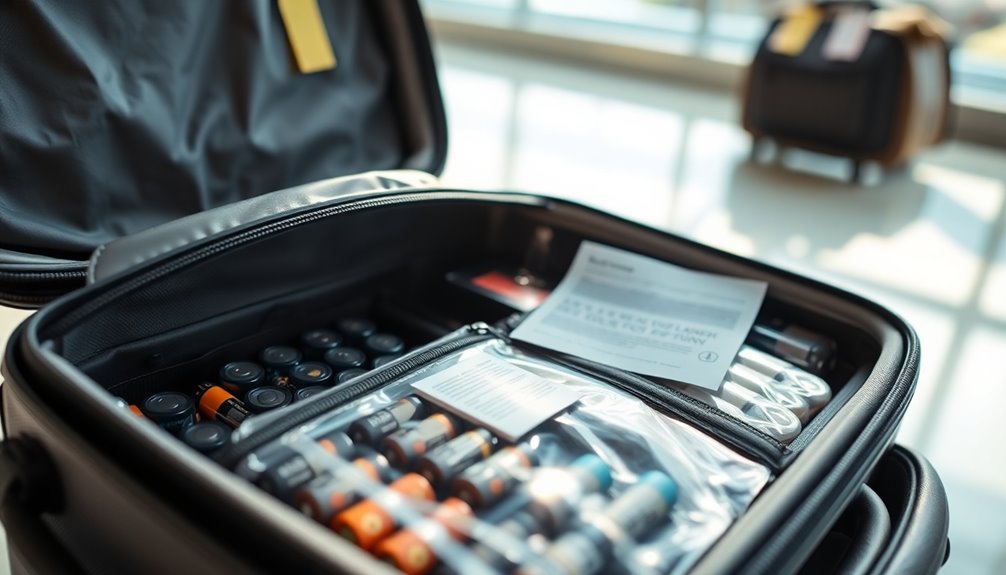
Understanding how to pack batteries properly is key to complying with airline regulations and ensuring a hassle-free journey.
When you pack batteries, always use their original packaging or protective cases to prevent damage and reduce the risk of short circuits. Remember, loose lithium batteries must be in your carry-on luggage, while batteries installed in devices can go in checked bags.
For lithium-ion batteries over 100 watt-hours, you can only carry two, and those exceeding 160 watt-hours are typically prohibited. To avoid accidental activation, tape the terminals and keep them organized for easier security checks.
Always inspect your batteries for damage before packing; damaged batteries should be retired and recycled to avoid safety hazards during travel.
Types of Batteries Allowed

Several types of batteries are allowed on planes, but it is crucial to know the specifics to avoid any issues during your travels. Here's a quick overview of what's permitted:
| Battery Type | Allowed Locations |
|---|---|
| Common Household Batteries | Carry-on or checked baggage |
| Spare Lithium Batteries | Carry-on only |
| Lithium Ion Batteries | Up to 100 watt-hours allowed; 101-160 watt-hours need approval |
You can pack installed lithium batteries in either carry-on or checked baggage. Keep in mind that portable rechargers, like power banks, are prohibited in checked luggage and must be carried in the cabin. Always check airport security guidelines to guarantee a smooth travel experience.
International Battery Regulations
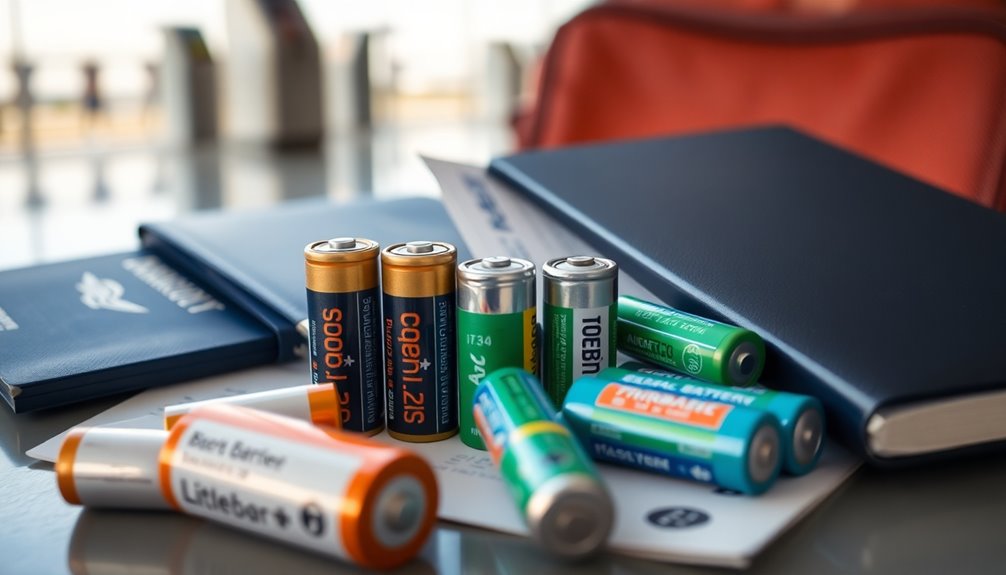
As you plan your travels, it's essential to be aware of international battery regulations that can impact your journey. Different countries have specific restrictions, especially regarding lithium batteries used in devices.
For instance, the EU prohibits larger lithium-ion batteries exceeding 160 Watt-hour, while Canada restricts those over 100 Watt-hour without prior airline approval. New Zealand's regulations are even stricter, banning loose batteries in checked baggage.
- Avoid the stress of confiscation at security.
- Prevent potential fire hazards on your flight.
- Enjoy peace of mind by understanding the restrictions.
Make sure to check individual airline policies about Batteries in Carry-On, as non-compliance could lead to delays or worse.
Stay informed and travel safely!
Handling Confiscated Batteries
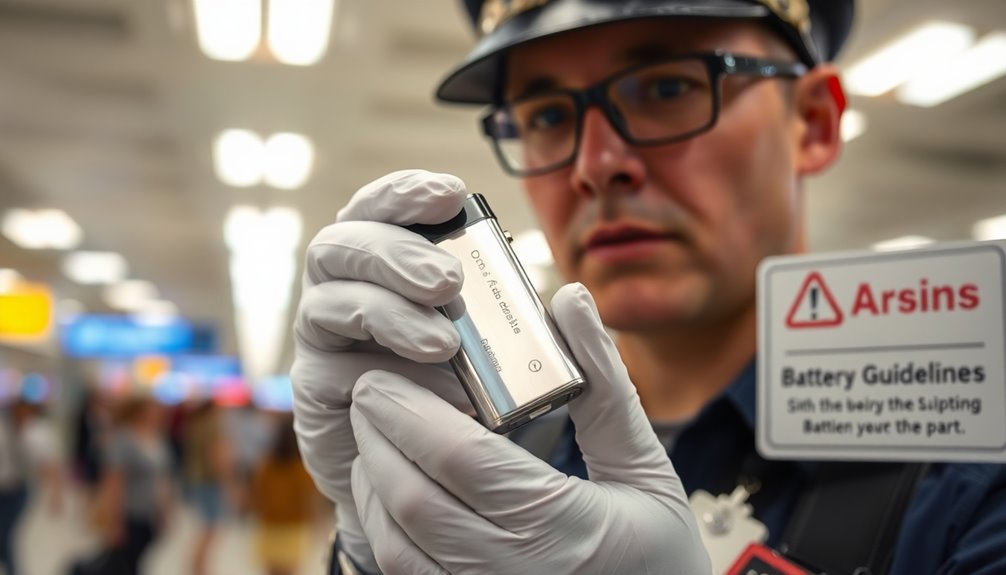
Even with a solid grasp of international battery regulations, you might still encounter situations where your batteries get confiscated at airport security. To minimize the risks associated with carrying batteries, always use the original packaging when possible. If security personnel confiscate your batteries, remember that retrieval options may be limited.
| Action | Possible Fees | Retrieval Options |
|---|---|---|
| Confiscated Batteries | Varies by airport | Contact security personnel |
| Allow extra time | N/A | Appeal process |
| Check regulations | N/A | Follow airport guidelines |
| Use original packaging | N/A | Understand policies |
| Avoid large batteries | N/A | Reduce confusion |
Familiarize yourself with airport policies to avoid complications during your journey.
Best Practices for Travelers
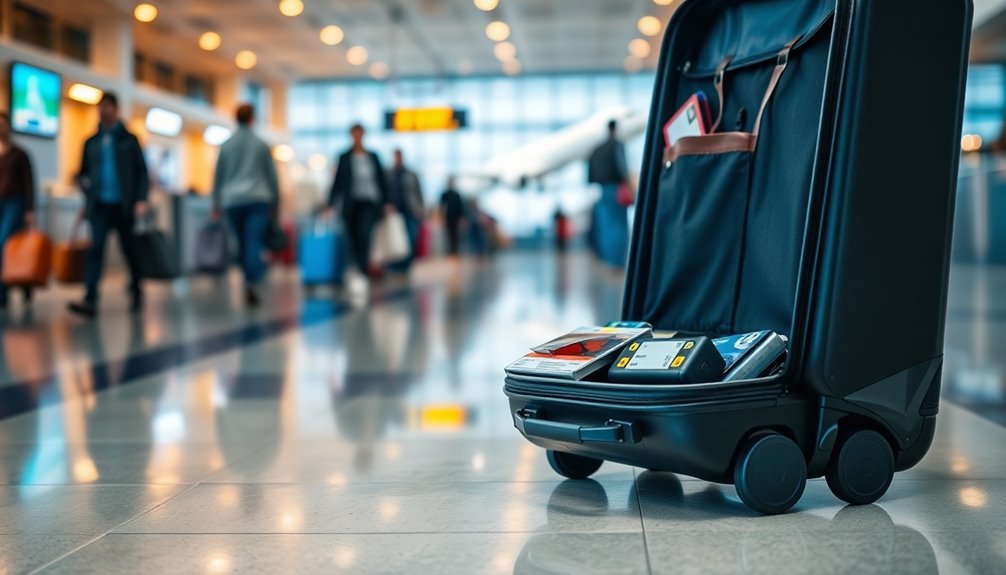
When you're packing for your flight, make sure to stow spare batteries in your carry-on, since checked baggage isn't allowed for them.
It's also smart to check your devices and batteries for any damage before you head to the airport.
Being prepared for security checks can save you time and hassle, so familiarize yourself with your airline's rules on battery transport.
Battery Packing Tips
Packing batteries for your flight can be straightforward if you follow a few key tips.
First, always bring batteries in your carry-on luggage to comply with regulations and keep them accessible. Use the original packaging or protective cases for your rechargeable batteries, and don't forget to tape battery terminals with tape or place them in Ziploc bags to minimize the chances of short-circuiting.
- Inspect all batteries for damage before traveling; safety first!
- Familiarize yourself with your airline's policies to avoid surprises.
- Keep spare batteries handy for devices you can't live without.
Security Check Preparedness
After ensuring your batteries are packed correctly, it's important to prepare for the security check at the airport.
Remember, all spare batteries must be carried in your carry-on luggage, making them easily accessible. Before your trip, inspect all batteries and electronic devices for any damage, as damaged batteries may be confiscated during screening.
Familiarize yourself with your airline's policies regarding battery transport to avoid confusion. If you're traveling with larger batteries, allow extra time for security clearance, since they might raise additional scrutiny.
Keep all batteries organized and visible in your carry-on. This way, you'll minimize delays and make the process smoother for yourself and the flight attendant overseeing the security check.
Emergency Procedures During Flight
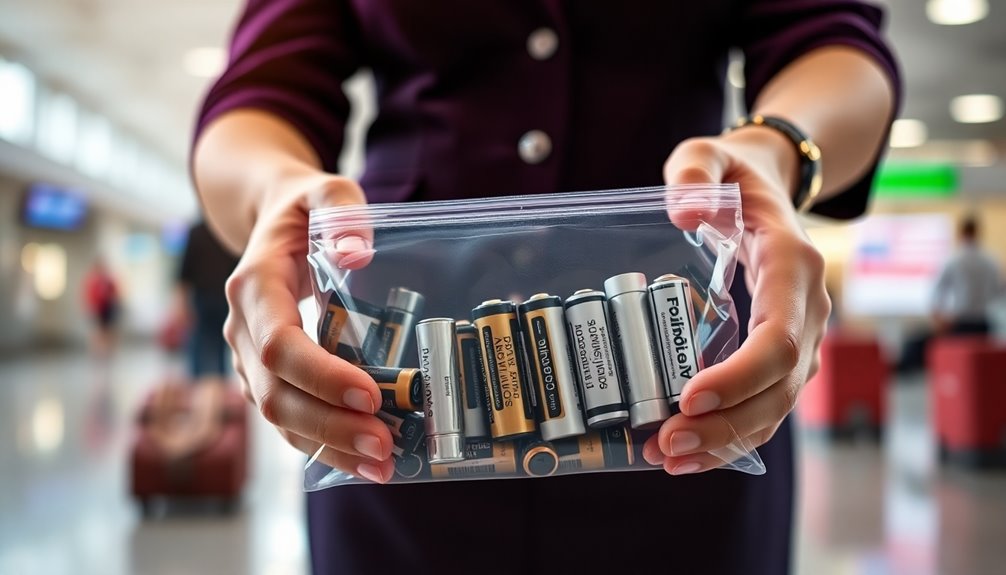
Should you notice any signs of overheating from a battery during your flight, it's crucial to act quickly.
If you see expansion, smoke, or burning, press the flight attendant call button immediately to alert the crew. They're trained in emergency procedures for battery incidents and have equipment ready to handle such situations.
Make sure you never use water to extinguish lithium battery fires, as it can make things worse.
Familiarize yourself with safety protocols before your flight to enhance your awareness.
- Feel the anxiety as you witness flames.
- Imagine the fear of an uncontrolled fire.
- Remember the importance of staying calm in emergencies.
Frequently Asked Questions
Can You Bring Batteries on a Plane Carry-On?
Yes, you can bring batteries in your carry-on luggage. Just confirm they're undamaged and properly packed.
Spare lithium batteries should always go in your carry-on, as checked bags aren't allowed for them. If you have high-capacity lithium batteries, remember you can only take two.
Common household batteries like AA or AAA are fine in both carry-on and checked bags. Just verify their terminals are protected to avoid short circuits.
What Are the TSA Guidelines for Batteries?
When you're packing batteries for your flight, you need to know the TSA guidelines. Undamaged batteries in devices are fine in both carry-on and checked luggage.
However, spare lithium batteries should only go in your carry-on, and high-capacity ones are limited to two per passenger.
Always pack loose batteries in protective cases to avoid short circuits.
Also, check your airline's specific policies, as they may vary from the TSA rules.
Are Batteries Allowed in Carry-On or Checked?
Yes, you can bring batteries in both carry-on and checked luggage, but there are some rules.
Undamaged lithium batteries in devices like smartphones are fine in either bag. Spare lithium batteries should only be in your carry-on.
If you've got high-capacity batteries, you can only take two in your carry-on. Always pack loose batteries in protective cases to avoid short circuits.
Make sure to check your airline's specific policies before you fly!
Where Do I Pack Batteries When Flying?
When you're flying, pack your spare lithium batteries in your carry-on luggage. This keeps them safe and complies with safety regulations.
If you've got common household batteries like AA or AAA, you can pack those in either carry-on or checked bags. Just remember to store lithium-ion batteries that exceed 100 watt-hours in your carry-on only.
Always use original packaging or protective cases to avoid damage and short circuits during your flight.
Conclusion
In summary, understanding battery regulations is essential for hassle-free travel. By following these guidelines, you can guarantee your devices stay powered without risking safety or facing confiscation. So, why take chances with your electronics? Make certain you pack your batteries correctly and stay informed about airline rules. With these tips in mind, you can focus on enjoying your journey without any unnecessary stress about your gear. Safe travels!

